Healthcare Assignment: Internal and External Changes for Obesity
VerifiedAdded on 2022/12/29
|6
|1431
|23
Report
AI Summary
This report delves into the multifaceted issue of overeating and obesity, exploring both individual and societal factors. It begins by examining internal changes individuals can make to control their eating habits, such as managing emotional eating and adopting healthier lifestyles. The report then shifts focus to the food industry, suggesting external changes like improved food policies, enhanced labeling, and modifications to fast-food practices to combat the obesity epidemic. Finally, it addresses the ethical principles relevant to this social problem, including the role of health ethics in shaping social policies and promoting healthy food choices. The report emphasizes the importance of a multi-disciplinary approach to address this critical public health concern, with references to relevant research and studies.
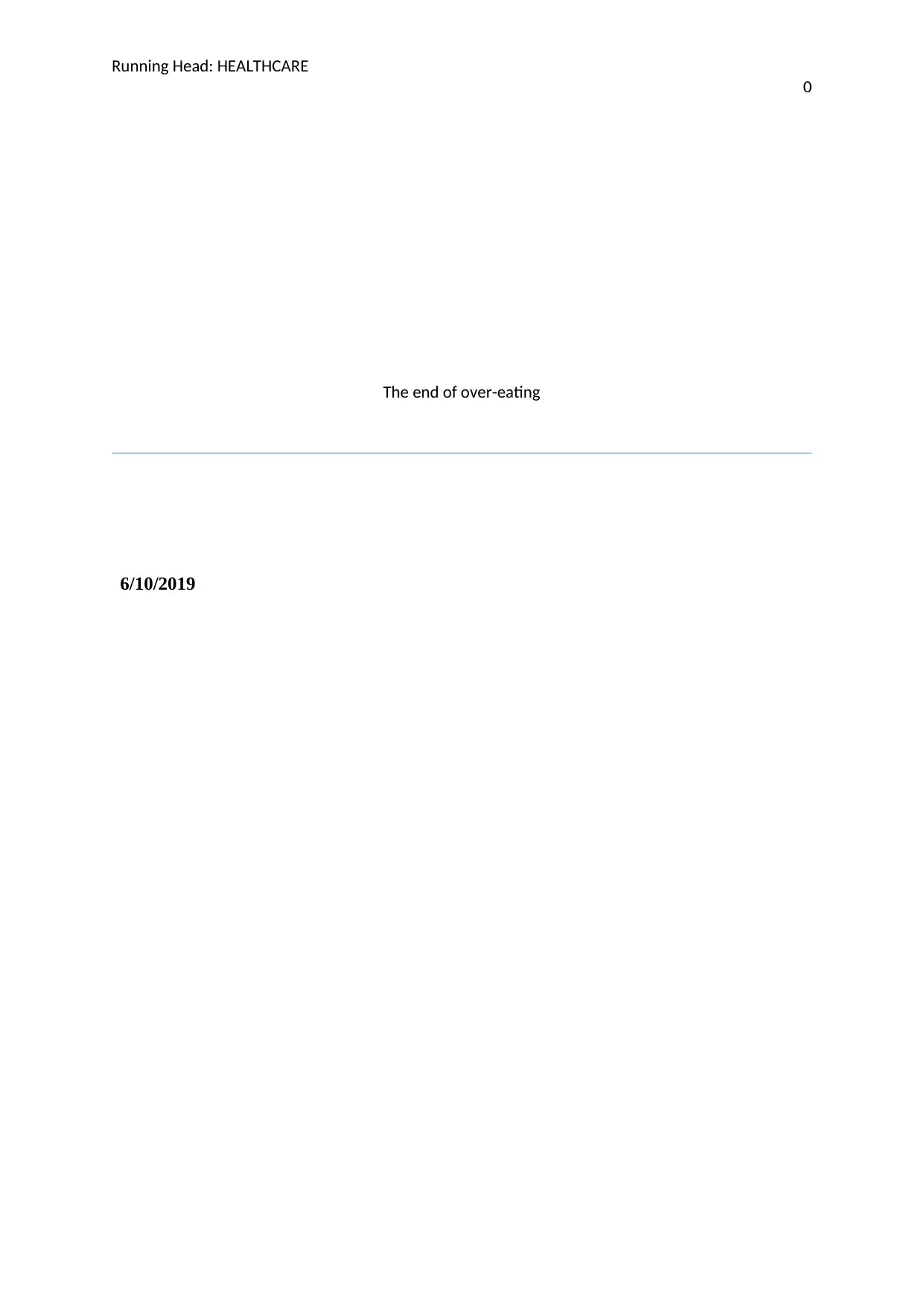
Running Head: HEALTHCARE
0
The end of over-eating
6/10/2019
0
The end of over-eating
6/10/2019
Paraphrase This Document
Need a fresh take? Get an instant paraphrase of this document with our AI Paraphraser
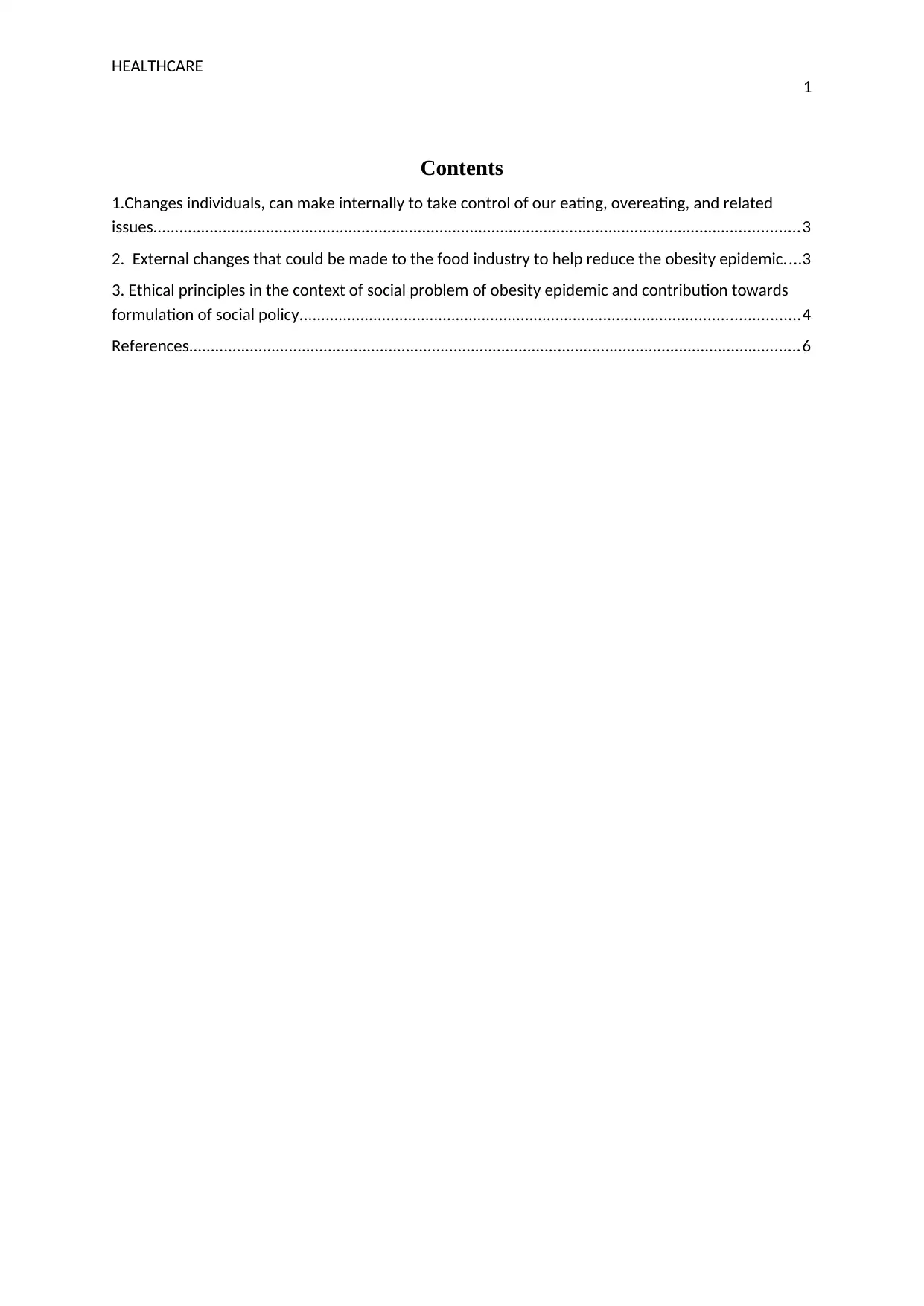
HEALTHCARE
1
Contents
1.Changes individuals, can make internally to take control of our eating, overeating, and related
issues.....................................................................................................................................................3
2. External changes that could be made to the food industry to help reduce the obesity epidemic....3
3. Ethical principles in the context of social problem of obesity epidemic and contribution towards
formulation of social policy...................................................................................................................4
References.............................................................................................................................................6
1
Contents
1.Changes individuals, can make internally to take control of our eating, overeating, and related
issues.....................................................................................................................................................3
2. External changes that could be made to the food industry to help reduce the obesity epidemic....3
3. Ethical principles in the context of social problem of obesity epidemic and contribution towards
formulation of social policy...................................................................................................................4
References.............................................................................................................................................6
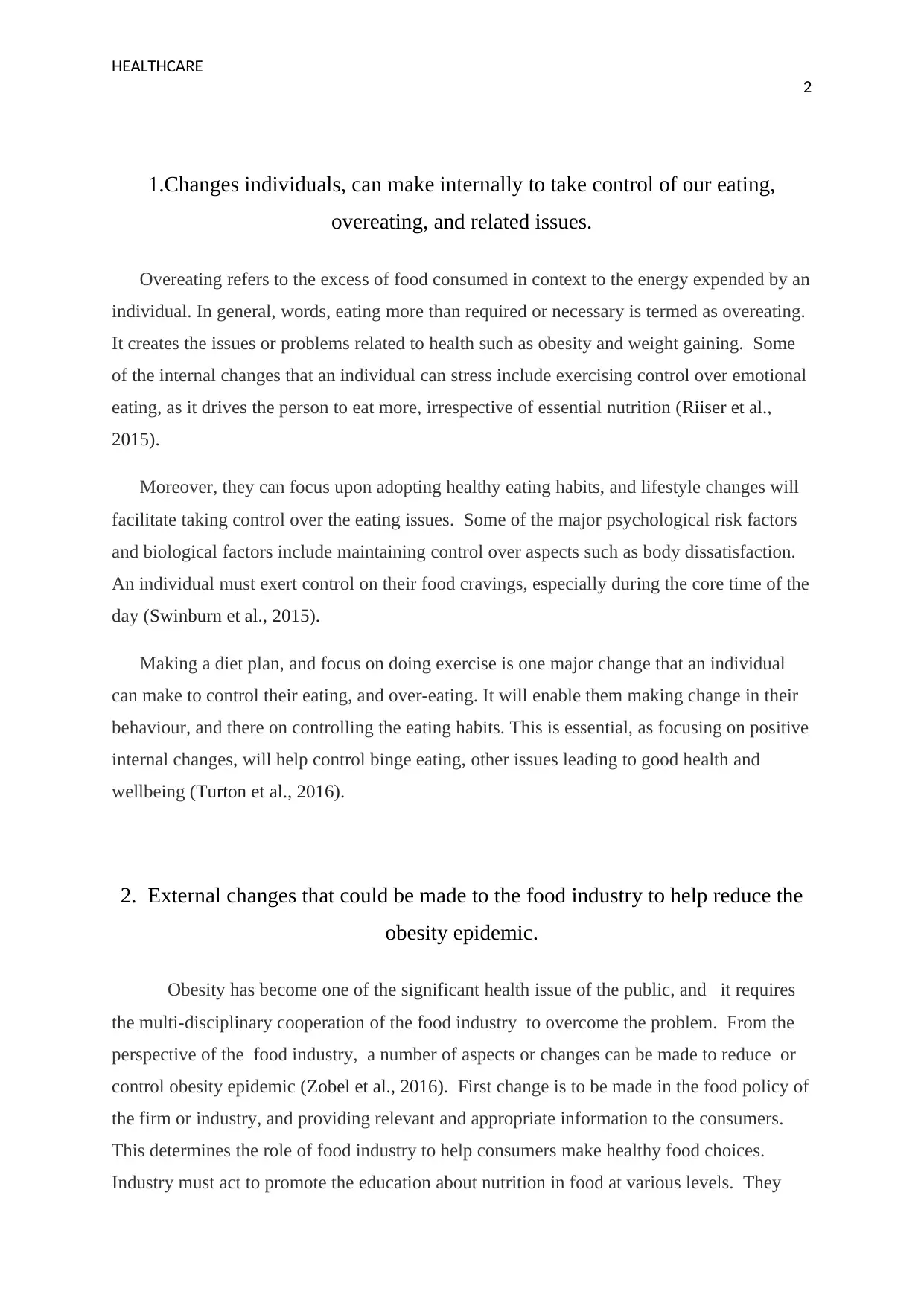
HEALTHCARE
2
1.Changes individuals, can make internally to take control of our eating,
overeating, and related issues.
Overeating refers to the excess of food consumed in context to the energy expended by an
individual. In general, words, eating more than required or necessary is termed as overeating.
It creates the issues or problems related to health such as obesity and weight gaining. Some
of the internal changes that an individual can stress include exercising control over emotional
eating, as it drives the person to eat more, irrespective of essential nutrition (Riiser et al.,
2015).
Moreover, they can focus upon adopting healthy eating habits, and lifestyle changes will
facilitate taking control over the eating issues. Some of the major psychological risk factors
and biological factors include maintaining control over aspects such as body dissatisfaction.
An individual must exert control on their food cravings, especially during the core time of the
day (Swinburn et al., 2015).
Making a diet plan, and focus on doing exercise is one major change that an individual
can make to control their eating, and over-eating. It will enable them making change in their
behaviour, and there on controlling the eating habits. This is essential, as focusing on positive
internal changes, will help control binge eating, other issues leading to good health and
wellbeing (Turton et al., 2016).
2. External changes that could be made to the food industry to help reduce the
obesity epidemic.
Obesity has become one of the significant health issue of the public, and it requires
the multi-disciplinary cooperation of the food industry to overcome the problem. From the
perspective of the food industry, a number of aspects or changes can be made to reduce or
control obesity epidemic (Zobel et al., 2016). First change is to be made in the food policy of
the firm or industry, and providing relevant and appropriate information to the consumers.
This determines the role of food industry to help consumers make healthy food choices.
Industry must act to promote the education about nutrition in food at various levels. They
2
1.Changes individuals, can make internally to take control of our eating,
overeating, and related issues.
Overeating refers to the excess of food consumed in context to the energy expended by an
individual. In general, words, eating more than required or necessary is termed as overeating.
It creates the issues or problems related to health such as obesity and weight gaining. Some
of the internal changes that an individual can stress include exercising control over emotional
eating, as it drives the person to eat more, irrespective of essential nutrition (Riiser et al.,
2015).
Moreover, they can focus upon adopting healthy eating habits, and lifestyle changes will
facilitate taking control over the eating issues. Some of the major psychological risk factors
and biological factors include maintaining control over aspects such as body dissatisfaction.
An individual must exert control on their food cravings, especially during the core time of the
day (Swinburn et al., 2015).
Making a diet plan, and focus on doing exercise is one major change that an individual
can make to control their eating, and over-eating. It will enable them making change in their
behaviour, and there on controlling the eating habits. This is essential, as focusing on positive
internal changes, will help control binge eating, other issues leading to good health and
wellbeing (Turton et al., 2016).
2. External changes that could be made to the food industry to help reduce the
obesity epidemic.
Obesity has become one of the significant health issue of the public, and it requires
the multi-disciplinary cooperation of the food industry to overcome the problem. From the
perspective of the food industry, a number of aspects or changes can be made to reduce or
control obesity epidemic (Zobel et al., 2016). First change is to be made in the food policy of
the firm or industry, and providing relevant and appropriate information to the consumers.
This determines the role of food industry to help consumers make healthy food choices.
Industry must act to promote the education about nutrition in food at various levels. They
⊘ This is a preview!⊘
Do you want full access?
Subscribe today to unlock all pages.

Trusted by 1+ million students worldwide
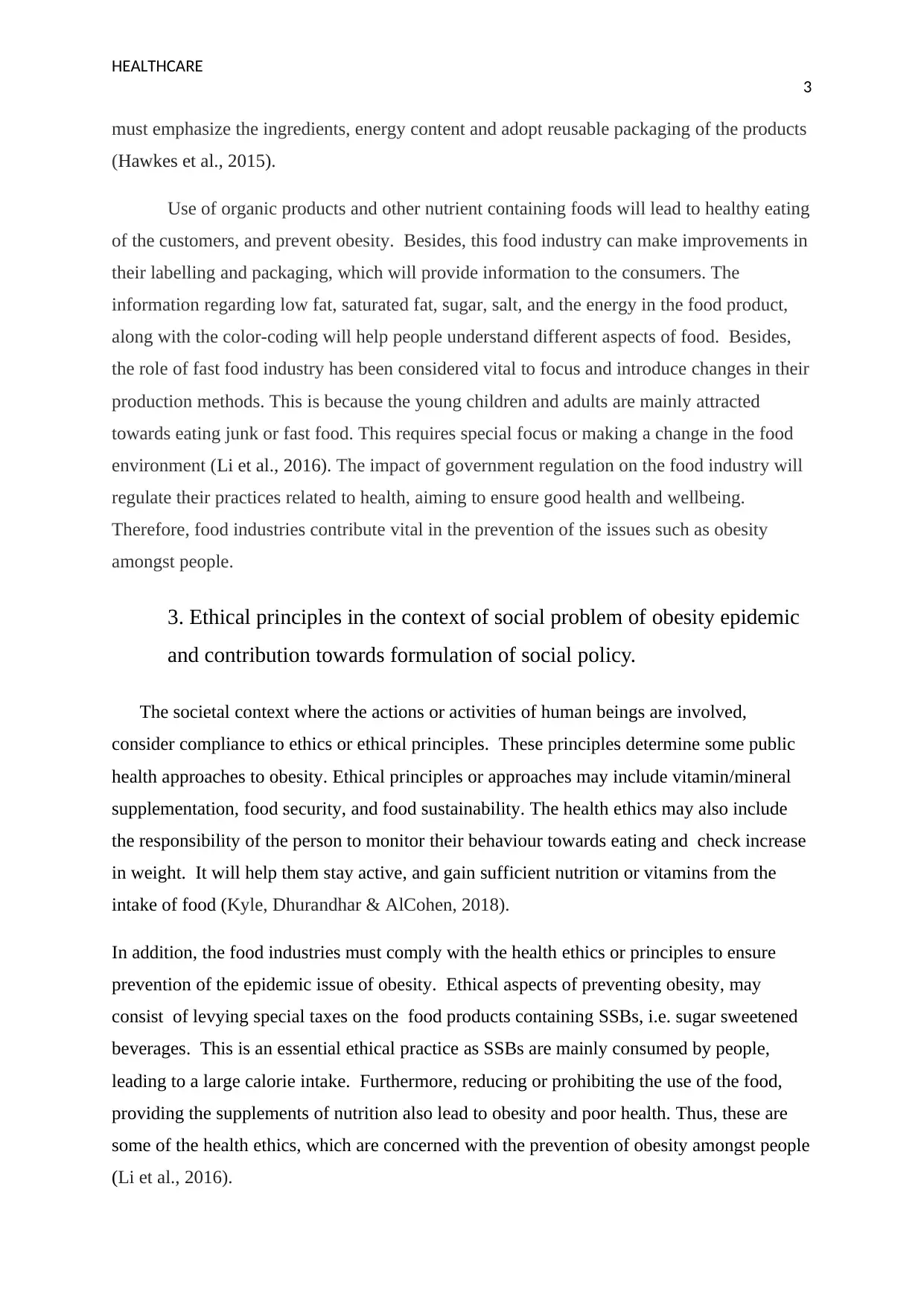
HEALTHCARE
3
must emphasize the ingredients, energy content and adopt reusable packaging of the products
(Hawkes et al., 2015).
Use of organic products and other nutrient containing foods will lead to healthy eating
of the customers, and prevent obesity. Besides, this food industry can make improvements in
their labelling and packaging, which will provide information to the consumers. The
information regarding low fat, saturated fat, sugar, salt, and the energy in the food product,
along with the color-coding will help people understand different aspects of food. Besides,
the role of fast food industry has been considered vital to focus and introduce changes in their
production methods. This is because the young children and adults are mainly attracted
towards eating junk or fast food. This requires special focus or making a change in the food
environment (Li et al., 2016). The impact of government regulation on the food industry will
regulate their practices related to health, aiming to ensure good health and wellbeing.
Therefore, food industries contribute vital in the prevention of the issues such as obesity
amongst people.
3. Ethical principles in the context of social problem of obesity epidemic
and contribution towards formulation of social policy.
The societal context where the actions or activities of human beings are involved,
consider compliance to ethics or ethical principles. These principles determine some public
health approaches to obesity. Ethical principles or approaches may include vitamin/mineral
supplementation, food security, and food sustainability. The health ethics may also include
the responsibility of the person to monitor their behaviour towards eating and check increase
in weight. It will help them stay active, and gain sufficient nutrition or vitamins from the
intake of food (Kyle, Dhurandhar & AlCohen, 2018).
In addition, the food industries must comply with the health ethics or principles to ensure
prevention of the epidemic issue of obesity. Ethical aspects of preventing obesity, may
consist of levying special taxes on the food products containing SSBs, i.e. sugar sweetened
beverages. This is an essential ethical practice as SSBs are mainly consumed by people,
leading to a large calorie intake. Furthermore, reducing or prohibiting the use of the food,
providing the supplements of nutrition also lead to obesity and poor health. Thus, these are
some of the health ethics, which are concerned with the prevention of obesity amongst people
(Li et al., 2016).
3
must emphasize the ingredients, energy content and adopt reusable packaging of the products
(Hawkes et al., 2015).
Use of organic products and other nutrient containing foods will lead to healthy eating
of the customers, and prevent obesity. Besides, this food industry can make improvements in
their labelling and packaging, which will provide information to the consumers. The
information regarding low fat, saturated fat, sugar, salt, and the energy in the food product,
along with the color-coding will help people understand different aspects of food. Besides,
the role of fast food industry has been considered vital to focus and introduce changes in their
production methods. This is because the young children and adults are mainly attracted
towards eating junk or fast food. This requires special focus or making a change in the food
environment (Li et al., 2016). The impact of government regulation on the food industry will
regulate their practices related to health, aiming to ensure good health and wellbeing.
Therefore, food industries contribute vital in the prevention of the issues such as obesity
amongst people.
3. Ethical principles in the context of social problem of obesity epidemic
and contribution towards formulation of social policy.
The societal context where the actions or activities of human beings are involved,
consider compliance to ethics or ethical principles. These principles determine some public
health approaches to obesity. Ethical principles or approaches may include vitamin/mineral
supplementation, food security, and food sustainability. The health ethics may also include
the responsibility of the person to monitor their behaviour towards eating and check increase
in weight. It will help them stay active, and gain sufficient nutrition or vitamins from the
intake of food (Kyle, Dhurandhar & AlCohen, 2018).
In addition, the food industries must comply with the health ethics or principles to ensure
prevention of the epidemic issue of obesity. Ethical aspects of preventing obesity, may
consist of levying special taxes on the food products containing SSBs, i.e. sugar sweetened
beverages. This is an essential ethical practice as SSBs are mainly consumed by people,
leading to a large calorie intake. Furthermore, reducing or prohibiting the use of the food,
providing the supplements of nutrition also lead to obesity and poor health. Thus, these are
some of the health ethics, which are concerned with the prevention of obesity amongst people
(Li et al., 2016).
Paraphrase This Document
Need a fresh take? Get an instant paraphrase of this document with our AI Paraphraser
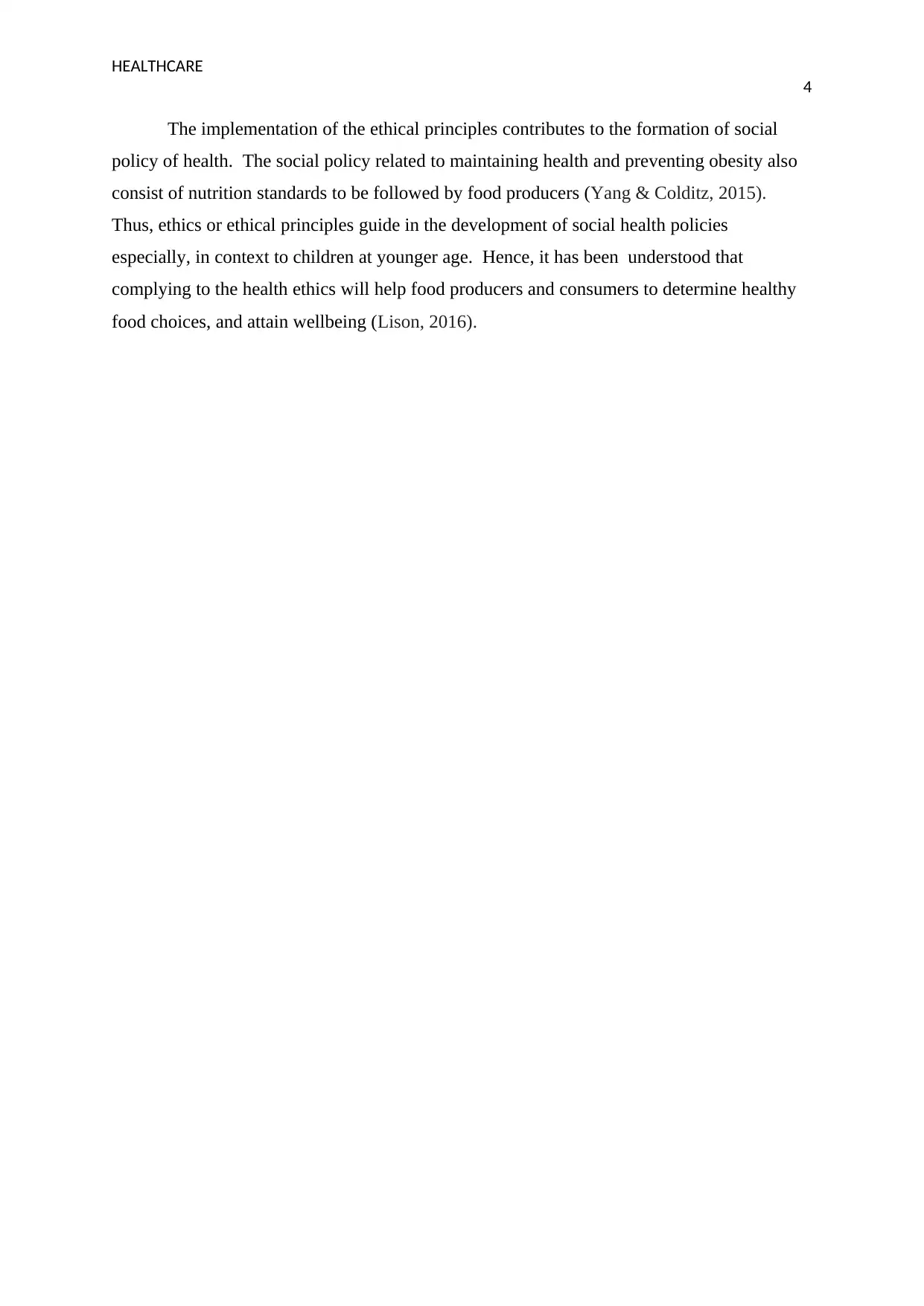
HEALTHCARE
4
The implementation of the ethical principles contributes to the formation of social
policy of health. The social policy related to maintaining health and preventing obesity also
consist of nutrition standards to be followed by food producers (Yang & Colditz, 2015).
Thus, ethics or ethical principles guide in the development of social health policies
especially, in context to children at younger age. Hence, it has been understood that
complying to the health ethics will help food producers and consumers to determine healthy
food choices, and attain wellbeing (Lison, 2016).
4
The implementation of the ethical principles contributes to the formation of social
policy of health. The social policy related to maintaining health and preventing obesity also
consist of nutrition standards to be followed by food producers (Yang & Colditz, 2015).
Thus, ethics or ethical principles guide in the development of social health policies
especially, in context to children at younger age. Hence, it has been understood that
complying to the health ethics will help food producers and consumers to determine healthy
food choices, and attain wellbeing (Lison, 2016).
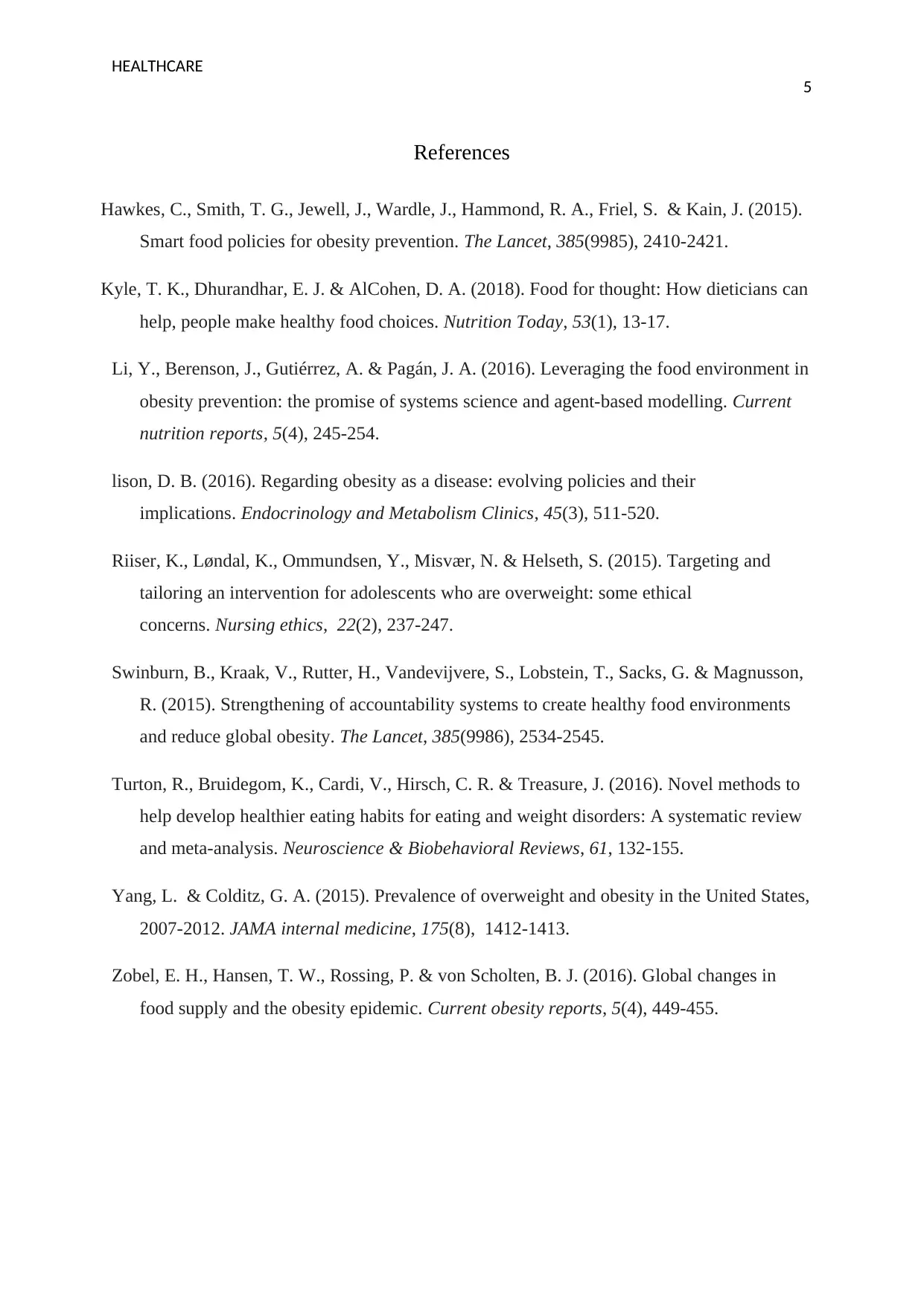
HEALTHCARE
5
References
Hawkes, C., Smith, T. G., Jewell, J., Wardle, J., Hammond, R. A., Friel, S. & Kain, J. (2015).
Smart food policies for obesity prevention. The Lancet, 385(9985), 2410-2421.
Kyle, T. K., Dhurandhar, E. J. & AlCohen, D. A. (2018). Food for thought: How dieticians can
help, people make healthy food choices. Nutrition Today, 53(1), 13-17.
Li, Y., Berenson, J., Gutiérrez, A. & Pagán, J. A. (2016). Leveraging the food environment in
obesity prevention: the promise of systems science and agent-based modelling. Current
nutrition reports, 5(4), 245-254.
lison, D. B. (2016). Regarding obesity as a disease: evolving policies and their
implications. Endocrinology and Metabolism Clinics, 45(3), 511-520.
Riiser, K., Løndal, K., Ommundsen, Y., Misvær, N. & Helseth, S. (2015). Targeting and
tailoring an intervention for adolescents who are overweight: some ethical
concerns. Nursing ethics, 22(2), 237-247.
Swinburn, B., Kraak, V., Rutter, H., Vandevijvere, S., Lobstein, T., Sacks, G. & Magnusson,
R. (2015). Strengthening of accountability systems to create healthy food environments
and reduce global obesity. The Lancet, 385(9986), 2534-2545.
Turton, R., Bruidegom, K., Cardi, V., Hirsch, C. R. & Treasure, J. (2016). Novel methods to
help develop healthier eating habits for eating and weight disorders: A systematic review
and meta-analysis. Neuroscience & Biobehavioral Reviews, 61, 132-155.
Yang, L. & Colditz, G. A. (2015). Prevalence of overweight and obesity in the United States,
2007-2012. JAMA internal medicine, 175(8), 1412-1413.
Zobel, E. H., Hansen, T. W., Rossing, P. & von Scholten, B. J. (2016). Global changes in
food supply and the obesity epidemic. Current obesity reports, 5(4), 449-455.
5
References
Hawkes, C., Smith, T. G., Jewell, J., Wardle, J., Hammond, R. A., Friel, S. & Kain, J. (2015).
Smart food policies for obesity prevention. The Lancet, 385(9985), 2410-2421.
Kyle, T. K., Dhurandhar, E. J. & AlCohen, D. A. (2018). Food for thought: How dieticians can
help, people make healthy food choices. Nutrition Today, 53(1), 13-17.
Li, Y., Berenson, J., Gutiérrez, A. & Pagán, J. A. (2016). Leveraging the food environment in
obesity prevention: the promise of systems science and agent-based modelling. Current
nutrition reports, 5(4), 245-254.
lison, D. B. (2016). Regarding obesity as a disease: evolving policies and their
implications. Endocrinology and Metabolism Clinics, 45(3), 511-520.
Riiser, K., Løndal, K., Ommundsen, Y., Misvær, N. & Helseth, S. (2015). Targeting and
tailoring an intervention for adolescents who are overweight: some ethical
concerns. Nursing ethics, 22(2), 237-247.
Swinburn, B., Kraak, V., Rutter, H., Vandevijvere, S., Lobstein, T., Sacks, G. & Magnusson,
R. (2015). Strengthening of accountability systems to create healthy food environments
and reduce global obesity. The Lancet, 385(9986), 2534-2545.
Turton, R., Bruidegom, K., Cardi, V., Hirsch, C. R. & Treasure, J. (2016). Novel methods to
help develop healthier eating habits for eating and weight disorders: A systematic review
and meta-analysis. Neuroscience & Biobehavioral Reviews, 61, 132-155.
Yang, L. & Colditz, G. A. (2015). Prevalence of overweight and obesity in the United States,
2007-2012. JAMA internal medicine, 175(8), 1412-1413.
Zobel, E. H., Hansen, T. W., Rossing, P. & von Scholten, B. J. (2016). Global changes in
food supply and the obesity epidemic. Current obesity reports, 5(4), 449-455.
⊘ This is a preview!⊘
Do you want full access?
Subscribe today to unlock all pages.

Trusted by 1+ million students worldwide
1 out of 6
Related Documents
Your All-in-One AI-Powered Toolkit for Academic Success.
+13062052269
info@desklib.com
Available 24*7 on WhatsApp / Email
![[object Object]](/_next/static/media/star-bottom.7253800d.svg)
Unlock your academic potential
Copyright © 2020–2026 A2Z Services. All Rights Reserved. Developed and managed by ZUCOL.





